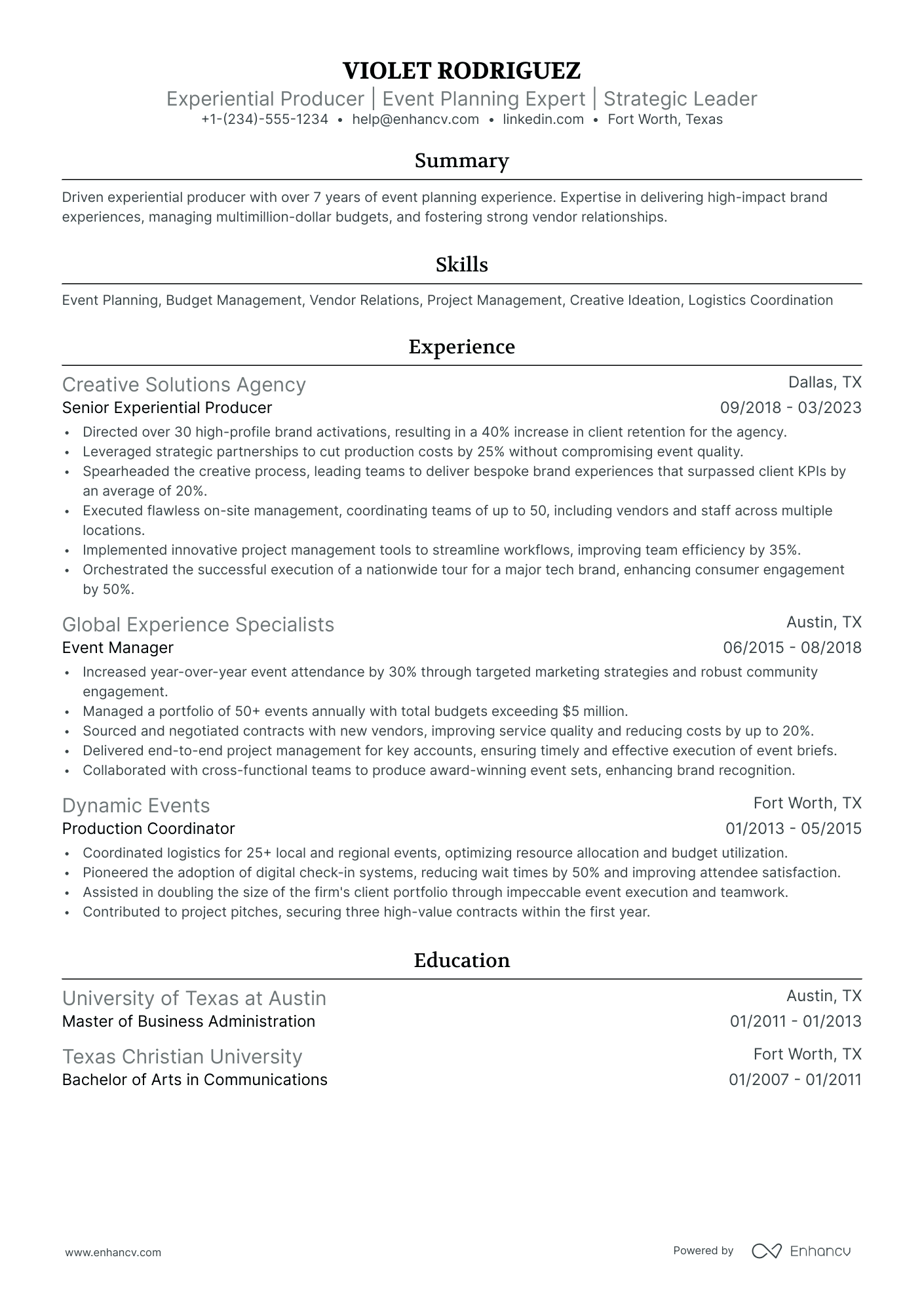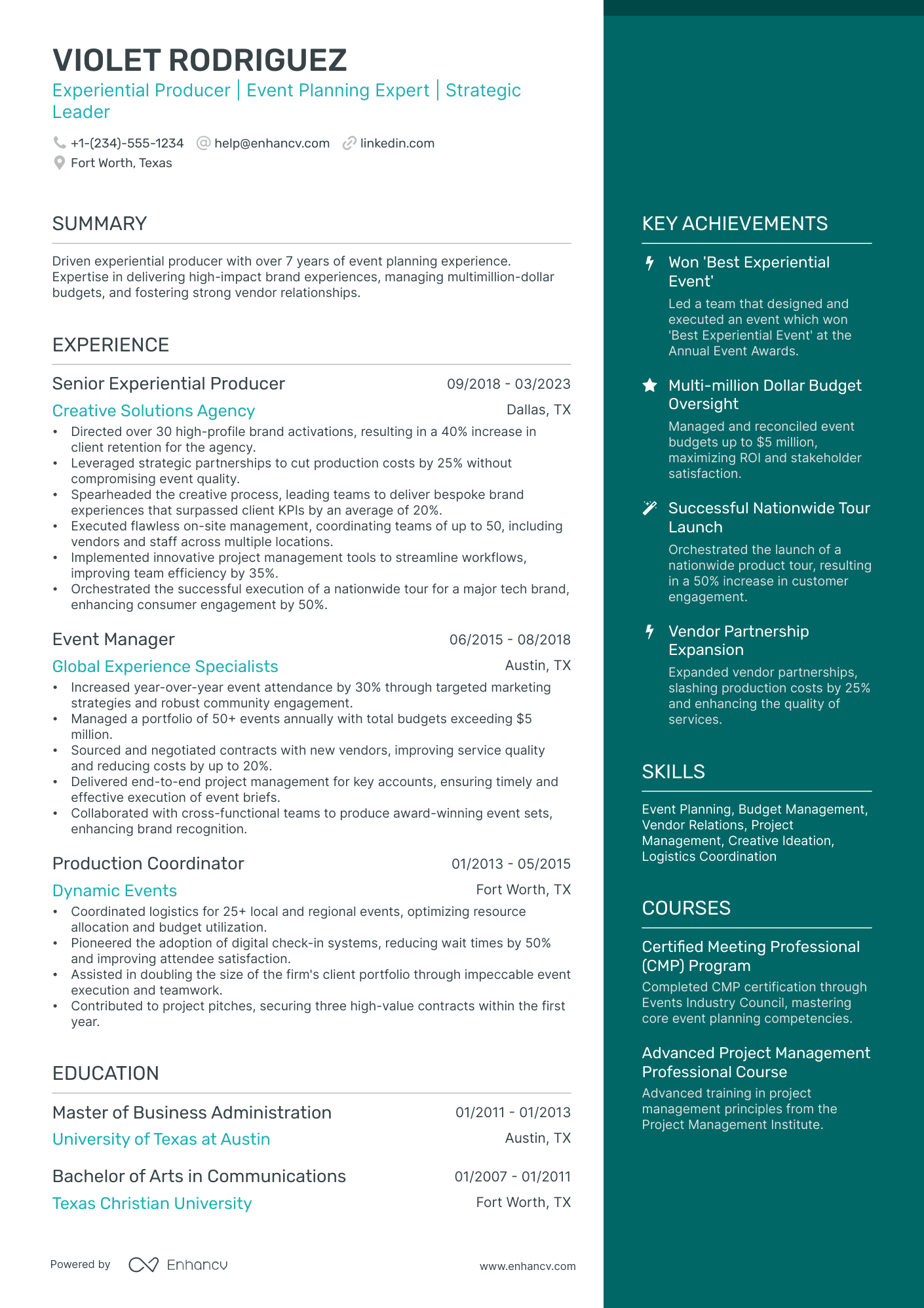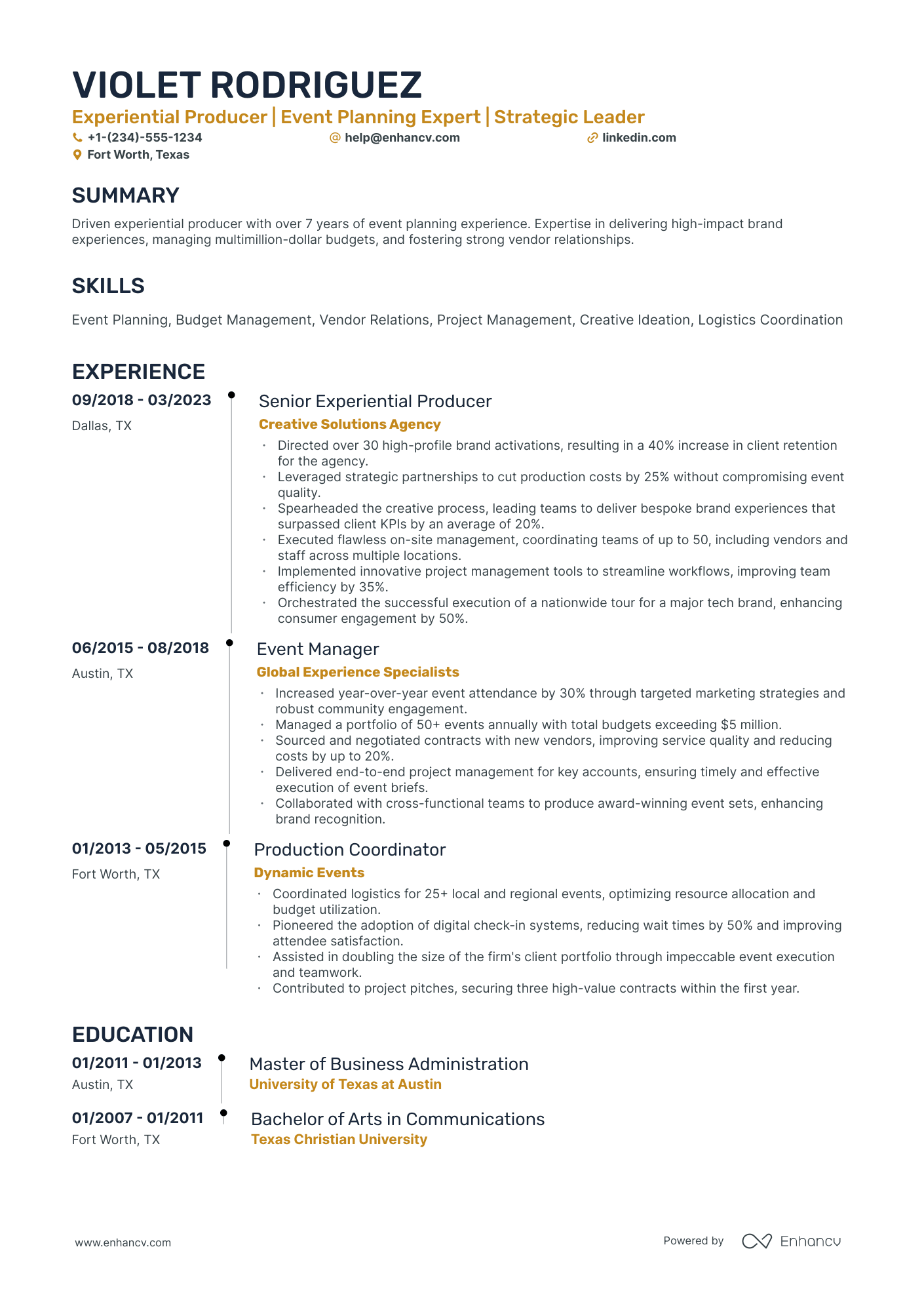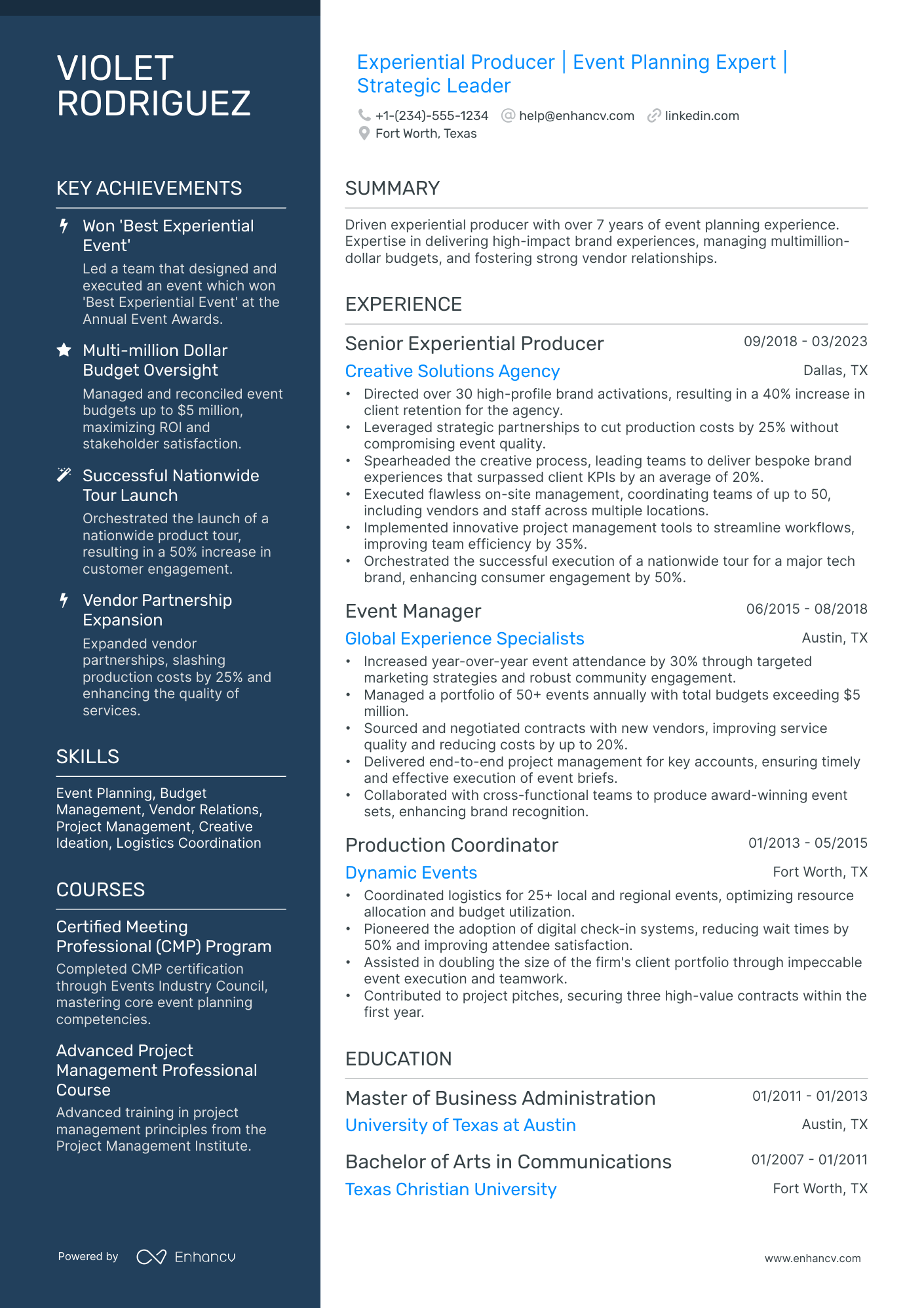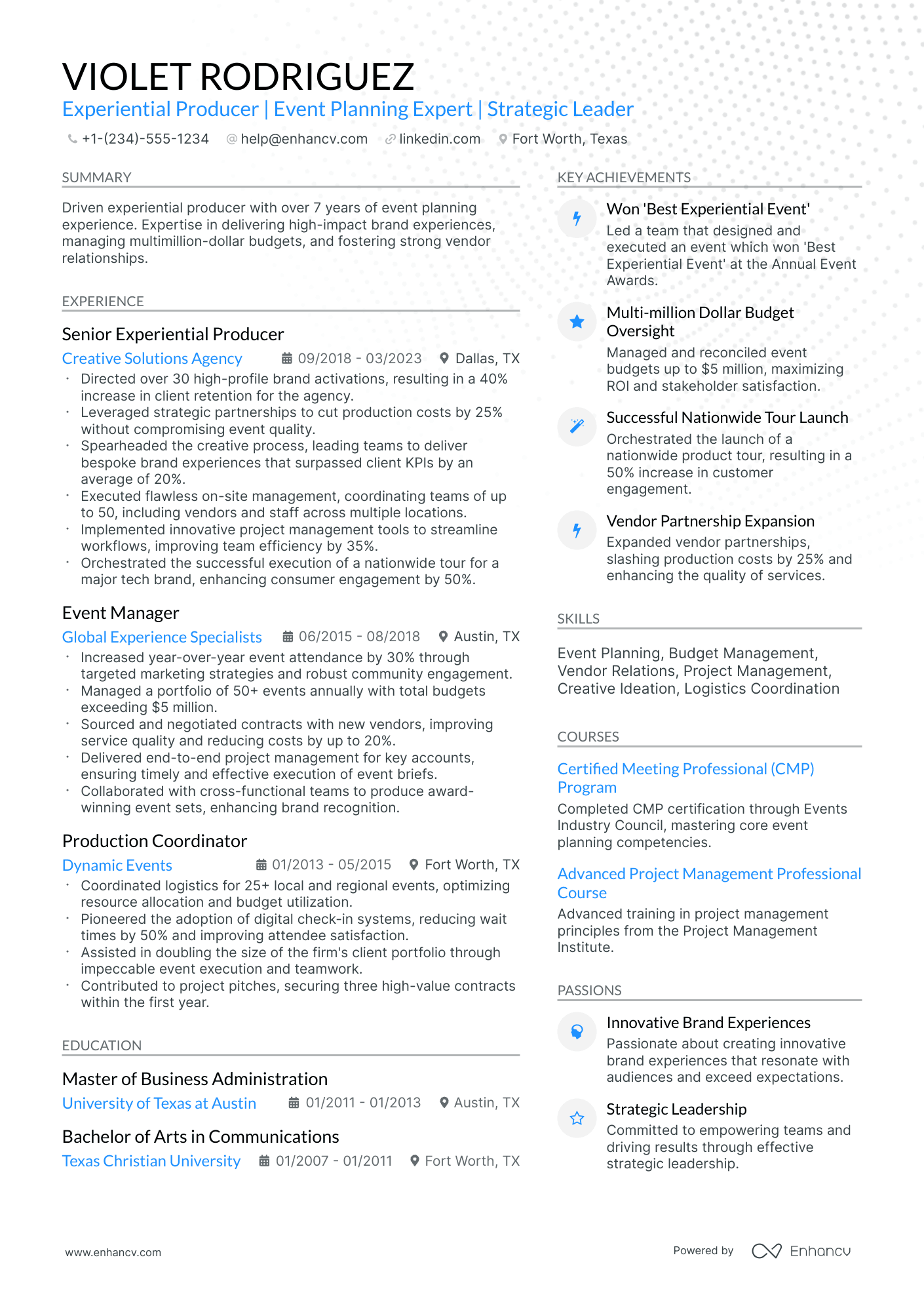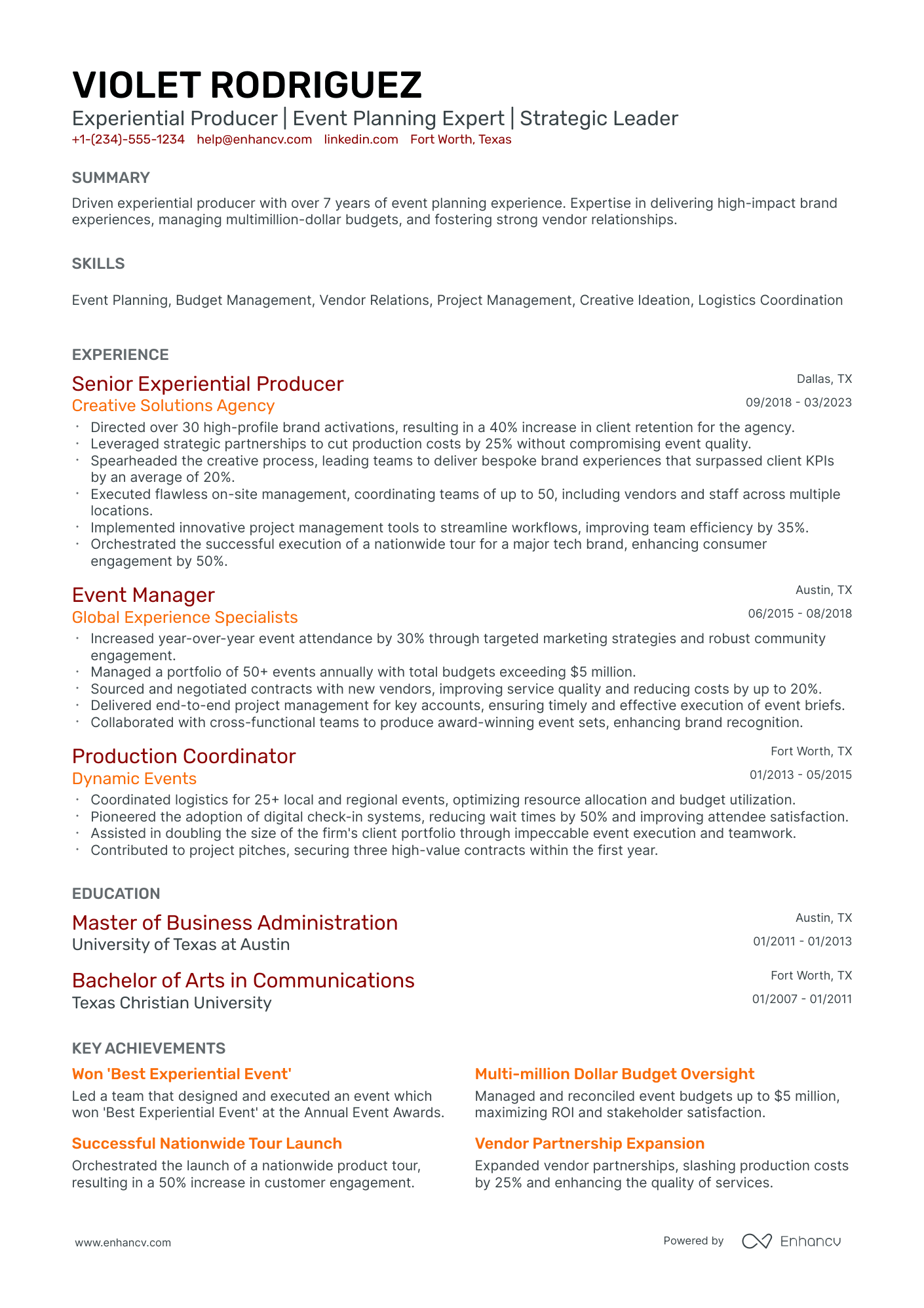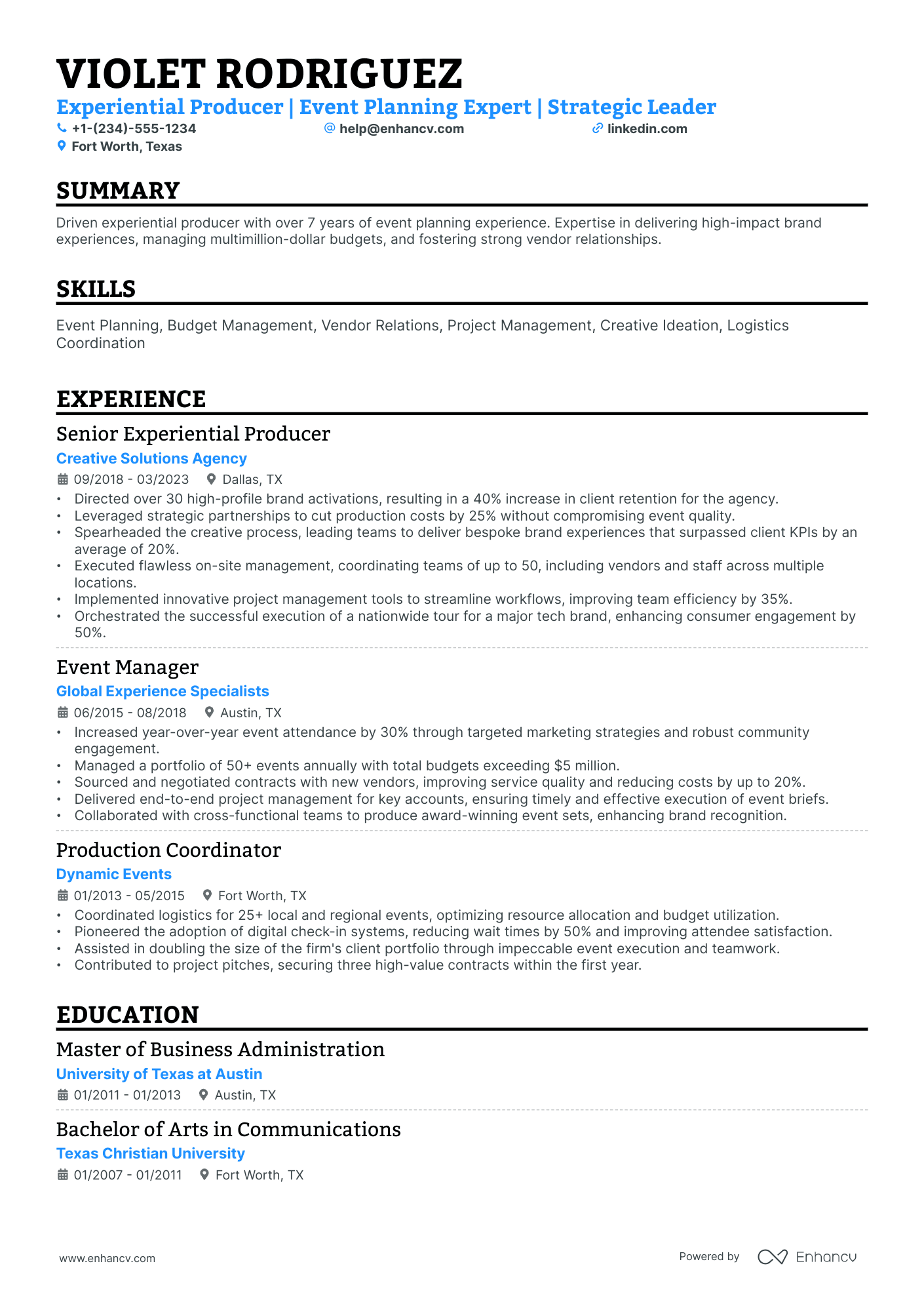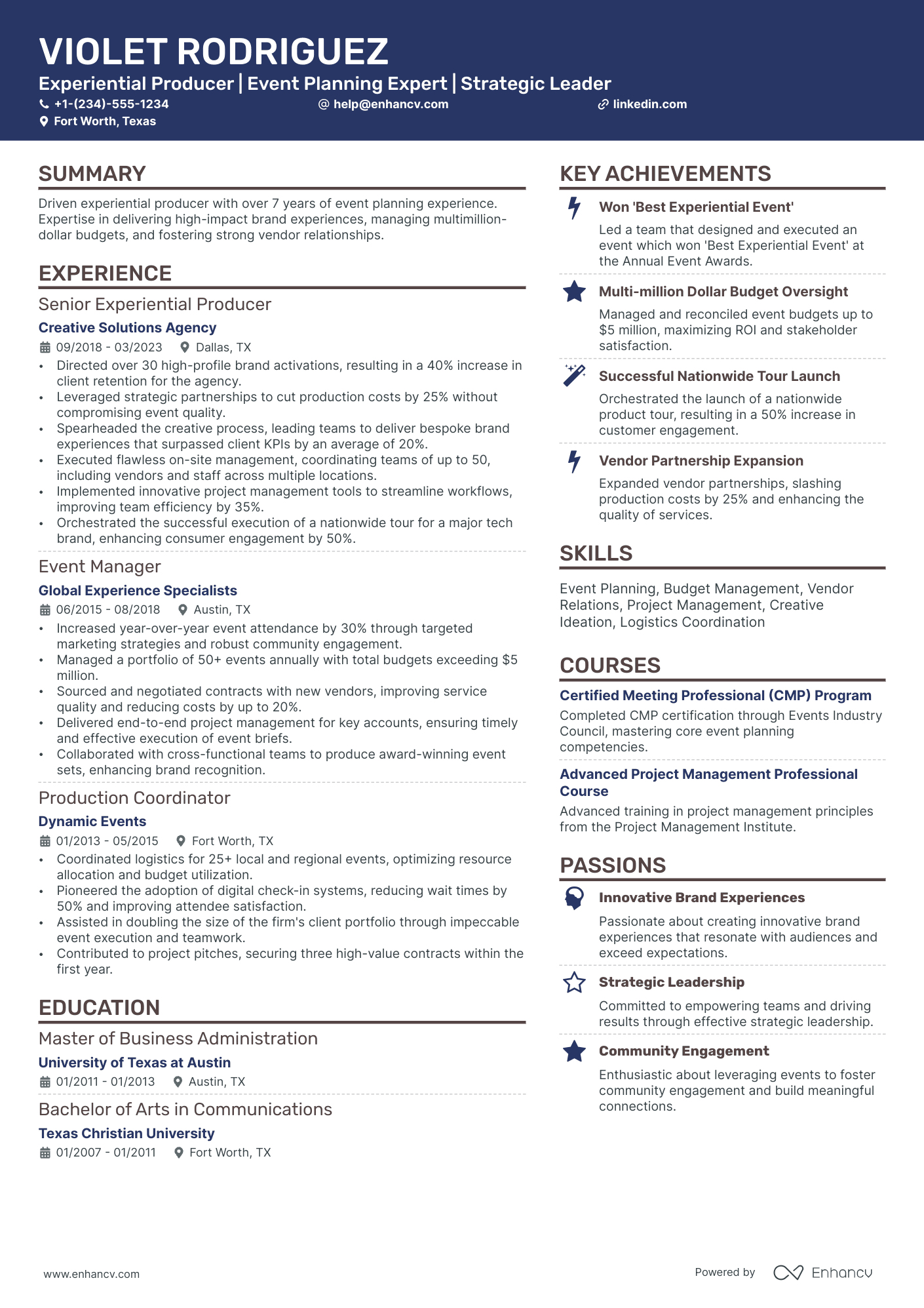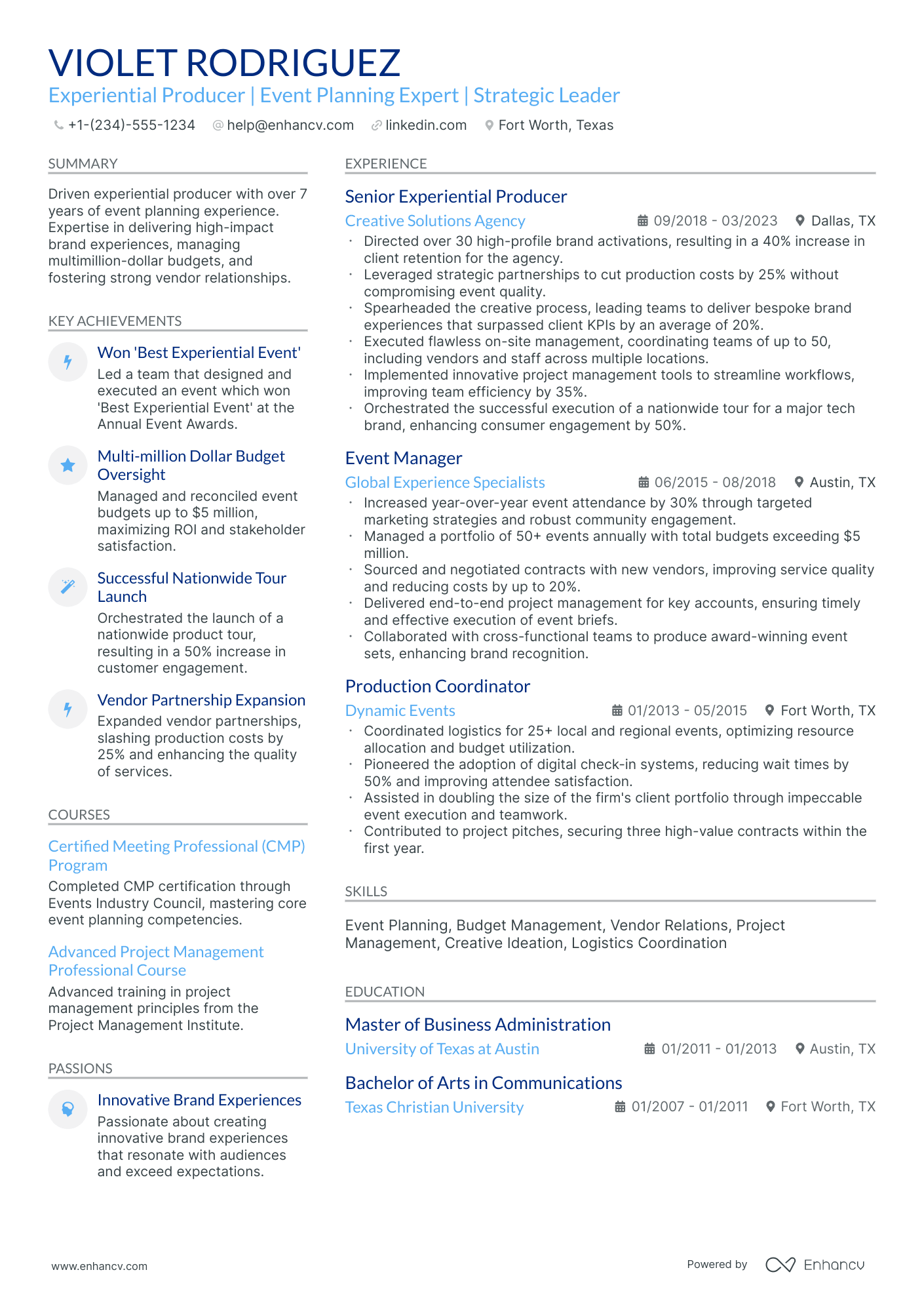Crafting a resume in experiential marketing often entails effectively showcasing the breadth and impact of interactive campaigns you've designed or managed. Our comprehensive guide provides tailored strategies to distill your dynamic projects into concise bullet points that capture the attention of hiring managers.
- Which sections do you need to include in your resume to meet recruiters' requirements;
- How to write your experiential marketing resume experience section - even if you have don't have little to no work experience;
- Real-life professional examples to guide you how to write the most important experiential marketing resume sections;
- Adding even more sections so your experiential marketing resume stands out with professionalism and your personality.
We've also selected some of the best (and most relevant) resume guides for the experiential marketing role you're applying for:
- Entry Level Digital Marketing Resume Example
- Brand Marketing Manager Resume Example
- Commercial Director Resume Example
- Content Manager Resume Example
- Sports Marketing Resume Example
- Community Manager Resume Example
- Growth Marketing Resume Example
- Brand Director Resume Example
- Public Relations Director Resume Example
Is there a correct way to format your experiential marketing resume?
This is a tricky question. While skimming over your resume, recruiters will be looking at your experience and the message your profile conveys. That's why your resume format needs to be clear and concise, serving to supplement and organize your experience. Professional best practices point that the best experiential marketing resumes:
- Follow the reverse chronological order, where the most recent experience items are presented first . This is to keep your expertise succinct and to show recruiters your career growth over the years;
- Have a clearly defined header that includes all relevant contact information and a portfolio or a LinkedIn link. In some countries, it is acceptable to include a professional photo , so that your application is more memorable;
- Feature the most important experiential marketing resume sections towards the top, e.g. summary, skills, and experience. That way, recruiters can immediately find information that is relevant to the role;
- Take up no more than two pages - and two pages are the exception for more experienced professionals. Keep your expertise to the point and use your experiential marketing resume real estate wisely .
- Selecting modern, yet simple fonts, e.g. Rubik, Lato, etc., would help your application stand out;
- Many candidates stick with the tried-and-tested Arial or Times New Roman, but you'd want your experiential marketing resume to be a bit more unique;
- The ATS can read all serif and sans-serif fonts, so you should avoid fancy, formal script (or cursive) fonts.
Each market has its own resume standards – a Canadian resume layout may differ, for example.
Upload & Check Your Resume
Drop your resume here or choose a file. PDF & DOCX only. Max 2MB file size.
PRO TIP
Always remember that your experiential marketing certifications can be quantified across different resume sections, like your experience, summary, or objective. For example, you could include concise details within the expertise bullets of how the specific certificate has improved your on-the-job performance.
The key to your experiential marketing job-winning resume - present your expertise with these sections:
- A header to make your resume more scannable
- Snapshot of who you are as a professional with your resume soft skills, achievements, and summary or objective
- Job advert keywords in the skills section of your resume
- Resume experience quantifying your past job successes with metrics
- A relevant education, certification, and technical sills section to provide background to your technological/software capabilities
What recruiters want to see on your resume:
- Proven track record of managing successful experiential marketing campaigns and events
- Strong skills in creative concept development and execution, particularly in creating immersive brand experiences
- Ability to analyze consumer behavior and tailor experiences to different target demographics
- Experience with multi-channel marketing integration, ensuring experiential campaigns complement digital, social, and traditional marketing efforts
- Excellent project management skills, with a focus on coordination, budget management, and timely delivery of initiatives
Experts' advice on writing your experiential marketing resume experience
While the excitement and motivation for writing your experiential marketing resume was present in the first hour (or so), you now find yourself staring at the blank page.
The resume experience section is the one that allows you to make a memorable impression by matching job requirement with your past jobs and accomplishments.
To help you write this resume section, here are four mistakes you need to avoid:
- Listing every job you have had so far, including the irrelevant ones. Before that, consider each of your past roles based on relevancy to the role. It may be the case that the job you had 15 years ago may have taught you invaluable skills that are appropriate for the role;
- Including irrelevant work experience items. Those are past jobs that aren't linked with the role you're applying for (or so they seem). Consider how your past jobs will serve your professional presentation: will they be filling in a gap in your work history, or just taking up space?
- Focusing on responsibilities instead of accomplishments. Your experiential marketing resume shouldn't just be telling recruiters what you did in the past - as it's most often the case that candidates have had similar responsibilities. But, rather, the experience section should showcase the success you've attained in each past role, thanks to your unique skill set;
- Consider listing just your professional experience. Any role you've had in the past - e.g. volunteering, internships, etc. - can make it into your experiential marketing resume experience section. Make sure to include it alongside numbers and results.
Two more things you need to remember about your resume experience section.
The first are keywords. Or those specific job requirements that are crucial for the role . Ensure you've integrated them across your experience section to get sorted closer to the ideal candidate profile by the Applicant Tracker System (ATS).
The second are action verbs. Each of your experience bullets should start with a strong action verb, followed by your specific skill and your on the job achievements. Follow this formula to hint to recruiters what your unique value as a professional is.
Still with us? In the next section, we will show you how industry-leading professionals have avoided the four most common mistakes, while integrating keywords and action verbs in their experience section.
- Led the development and execution of immersive product launch experiences for 5 major tech brands, resulting in a 30% average increase in consumer engagement metrics.
- Managed cross-functional teams of 20+ including designers, strategists, and event staff to deliver tailored experiences across the nation.
- Negotiated and secured strategic partnerships with influential event venues and social media influencers, broadening campaign reach by 45%.
- Created and implemented an annual experiential marketing strategy for consumer electronics sector, driving brand awareness and increasing sales by 20%.
- Systematized data capture methods during live experiences to collect over 10,000 consumer insights, enhancing future campaign targeting.
- Orchestrated a multi-city pop-up tour for a new smartphone release, directly engaging with over 50,000 participants.
- Pioneered an AR-driven marketing campaign that amplified customer experience and increased time spent at activations by 35%.
- Coordinated with product management teams to ensure experiential campaigns accurately reflected brand messaging and product positioning.
- Cultivated and led a dedicated experiential marketing department, scaling the team from 3 to 15 employees while maintaining a high standard of campaign delivery.
- Spearheaded a guerrilla marketing campaign for a startup beverage company, achieving a viral social media response and a 50% increase in regional sales.
- Established a comprehensive event sponsorship strategy, successfully positioning the brand at 25+ high-profile music festivals and sports events per year.
- Implemented a brand ambassador program that grew to cover 10 key markets, engaging with customers on a personal level and driving loyalty.
- Orchestrated a nationwide mobile tour for a new fitness app, encompassing 40 events and reaching an estimated 100,000 live participants.
- Expanded event marketing capabilities with a 25% uptick in annual leads through innovative experiential activations and A/B testing of engagement tactics.
- Partnered with analytics teams to establish ROI measures for events, increasing experiential budget allocation by demonstrating a 3:1 return on investment.
- Refined an experiential content strategy for virtual reality demonstrations across 50 global locations, with a focus on high-fidelity user interaction.
- Collaborated with R&D departments to integrate cutting-edge technology into brand experiences, securing a 20% market share in a newly established tech domain.
- Led a pandemic-response initiative to transition in-person experiences to virtual formats, effectively maintaining engagement levels.
- Managed experiential activations at top-tier automotive trade shows, resulting in an industry-recognized 'Best in Show' award and a record-high lead generation.
- Directed a traveling interactive installation that educated consumers on automotive safety technologies, reaching 20 cities and directly engaging with over 30,000 attendees.
- Formulated comprehensive post-event analysis reports, using both quantitative and qualitative data, to enhance future experiential marketing strategies.
- Launched a series of experiential learning labs for B2B clients, demonstrating product solutions through interactive showcases and driving a 15% increase in contract renewals.
- Coordinated with corporate sales teams to integrate experiential tactics into traditional sales approaches, leading to a seamless customer journey.
- Developed a targeted brand activation at SXSW that connected with over 5,000 industry professionals, significantly raising the company's profile within the tech community.
Quantifying impact on your resume
- Highlight the percentage increase of brand engagement metrics resulting from experiential marketing campaigns you have led.
- Include the number of successful experiential events managed and their corresponding attendance figures.
- Quantify the growth in social media followers or online community size due to your experiential initiatives.
- Document the budget sizes you have managed and how you optimized expenditure to maximize event impact.
- Report on conversion rates from experiential activations to actual sales or leads generated for the business.
- Mention any industry awards or recognitions received for the experiential marketing campaigns you've worked on.
- Describe the extent of media coverage, in numbers, that your events received, including impressions and reach.
- Provide specific examples of customer satisfaction or NPS (Net Promoter Score) improvements that your campaigns caused.
Action verbs for your experiential marketing resume
Guide for experiential marketing professionals kicking off their career
Who says you can't get that experiential marketing job, even though you may not have that much or any experience? Hiring managers have a tendency to hire the out-of-the-blue candidate if they see role alignment. You can show them why you're the best candidate out there by:
- Selecting the functional skill-based or hybrid formats to spotlight your unique value as a professional
- Tailoring your experiential marketing resume to always include the most important requirements, found towards the top of the job ad
- Substituting the lack of experience with other relevant sections like achievements, projects, and research
- Pinpoint both achievements and how you see yourself within this specific role in the experiential marketing resume objective.
Recommended reads:
PRO TIP
Bold the names of educational institutions and certifying bodies for emphasis.
The heart and soul of your experiential marketing resume: hard skills and soft skills
If you read between the lines of the experiential marketing role you're applying for, you'll discover that all requirements are linked with candidates' hard skills and soft skills.
What do those skills have to do with your application?
Hard or technical skills are the ones that hint at your aptitude with particular technologies. They are easy to quantify via your professional experience or various certifications.
Meanwhile, your soft skills are more difficult to assess as they are personality traits, you've gained thanks to working in different environments/teams/organizations.
Your experiential marketing resume skills section is the perfect opportunity to shine a light on both types of skills by:
- Dedicating a technical skills section to list up to six technologies you're apt at.
- Focusing a strengths section on your achievements, thanks to using particular people skills or technologies.
- Including a healthy balance of hard and soft skills in the skills section to answer key job requirements.
- Creating a language skills section with your proficiency level - to hint at an abundance of soft skills you've obtained, thanks to your dedication to learning a particular language.
Within the next section of this guide, stay tuned for some of the most trending hard skills and soft skills across the industry.
Top skills for your experiential marketing resume:
Event Management Software
Customer Relationship Management (CRM) Tools
Social Media Marketing Platforms
Data Analytics Tools
Graphic Design Software
Email Marketing Tools
Content Management Systems (CMS)
Virtual Reality (VR) Technology
Augmented Reality (AR) Technology
Project Management Software
Creativity
Communication
Team Collaboration
Adaptability
Problem Solving
Time Management
Attention to Detail
Strategic Thinking
Networking
Emotional Intelligence
PRO TIP
The more time and effort you've put into obtaining the relevant certificate, the closer to the top it should be listed. This is especially important for more senior roles and if the company you're applying for is more forward-facing.
The experiential marketing resume sections you may underestimate: certifications and education
Your education and certifications provide insight into both your technical capabilities and personal attributes, such as perseverance. When crafting your experiential marketing resume, consider how you present these elements:
- For your higher education degrees, prioritize listing those most relevant to the job or indicative of your academic dedication;
- Include applicable coursework as a stand-in for relevant experience or if it might impress recruiters;
- Include incomplete higher education only if it's pertinent to meeting job requirements;
- If your degree is from a renowned university, mention how often you made the Dean's list to underline academic excellence.
Regarding certifications, it's not necessary to list all of them. Instead, match up to three of your most recent or significant certificates with the technical skills required in the job description.
Below, we've selected some of the top industry certifications that could be vital additions to your experiential marketing resume.
The top 5 certifications for your experiential marketing resume:
- Certified Trade Show Marketer (CTSM) - Exhibitor
- Professional Certified Marketer (PCM) - American Marketing Association
- Certified Event Planning Specialist (CEPS) - National Career Certification Board
- Digital Marketing Professional Certification (DMP) - Digital Marketing Institute
- Content Marketing Certification (CMC) - HubSpot Academy
PRO TIP
List your educational qualifications and certifications in reverse chronological order.
Recommended reads:
Which one to use: a resume summary or a resume objective?
The experiential marketing resume summary or objective serves as a good introduction to your experience for recruiters.
Have you ever wondered which one (the summary or objective) will be more appropriate for your experiential marketing resume?
- If you are a less experienced professional, write a resume objective statement. The objective is about three sentences long and provides recruiters with information about your career goals, strengths, and achievements . It should basically denote how you see yourself in this particular role, and what is your relevant experience and/or know-how;
- If you happen to have plenty of relevant experience, select your most impressive achievements for your resume summary. The summary is no longer than five sentences and serves as a storytelling instrument - highlighting your greatest career wins . Don't forget to align your summary with the job requirements to ensure your resume stays relevant to the role.
Read on for more information and examples of resume summaries and objectives from real world professionals.
Resume summaries for a experiential marketing job
- Accomplished experiential marketing Manager with over 10 years in the industry, specializing in creating memorable brand events that drive engagement and sales. Possesses a robust portfolio of successful campaigns for Fortune 500 companies, with a proven track record of exceeding KPIs through innovative strategy and meticulous execution.
- Dynamic professional with 8 years as a Creative Director, now venturing into experiential marketing. Leverages a keen eye for design and audience engagement, combined with a history of orchestrating award-winning advertising campaigns, eager to apply creative talents to create impactful real-world brand experiences.
- Former Event Coordinator with 5 years of experience managing large-scale corporate events, aspiring to pivot into experiential marketing. Proficient in logistics management and vendor relations, ready to harness organizational strengths to craft immersive events that resonate with target audiences and boost brand loyalty.
- As a seasoned Brand Strategist with 12 years in the digital marketing sector seeking to transition into experiential marketing, I bring a mastery of audience analysis and cross-platform campaign integration, keen to leverage consumer insights to produce powerful, sensory marketing experiences that strengthen brand presence.
- Seeking to embark on a career in experiential marketing, armed with a Bachelor's degree in Marketing and an infectious passion for creating authentic brand stories. Eager to leverage academic knowledge and outstanding communication skills to design and execute marketing experiences that captivate and convert.
- Driven marketing graduate with a special interest in experiential campaigns, aiming to leverage a strong foundation in marketing principles and a dedication to creating brands that people love. Excited to apply problem-solving abilities and a fresh perspective to designing memorable marketing experiences that drive growth and brand engagement.
Optimize your resume summary and objective for ATS
Drop your resume here or choose a file.
PDF & DOCX only. Max 2MB file size.
Showcasing your personality with these four experiential marketing resume sections
Enhance your experiential marketing expertise with additional resume sections that spotlight both your professional skills and personal traits. Choose options that not only present you in a professional light but also reveal why colleagues enjoy working with you:
- My time - a pie chart infographic detailing your daily personal and professional priorities, showcasing a blend of hard and soft skills;
- Hobbies and interests - share your engagement in sports, fandoms, or other interests, whether in your local community or during personal time;
- Quotes - what motivates and inspires you as a professional;
- Books - indicating your reading and comprehension skills, a definite plus for employers, particularly when your reading interests align with your professional field.
Key takeaways
- All aspects of your resume should be selected to support your bid for being the perfect candidate for the role;
- Be intentional about listing your skill set to be balanced with both technical and people capabilities, while aligning with the job;
- Include any experience items that are relevant to the role and ensure you feature the outcomes of your responsibilities;
- Use the summary or objective as a screenshot of your best experience highlights;
- Curate various resume sections to showcase personal, transferable skills.
